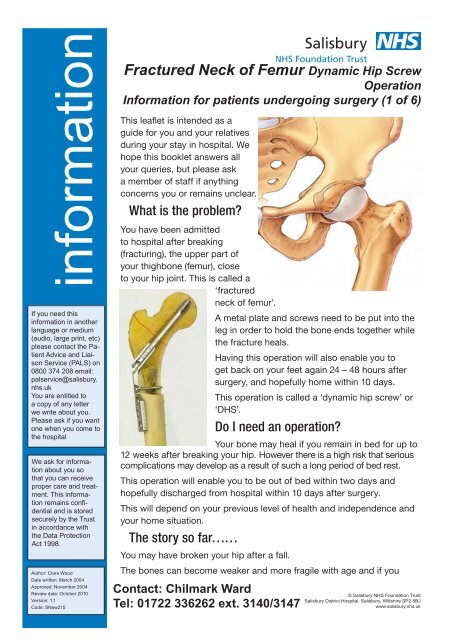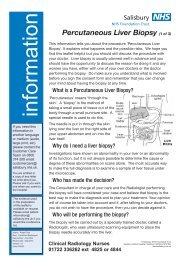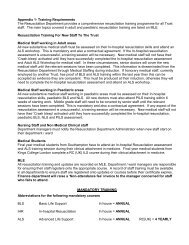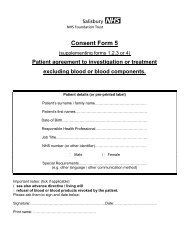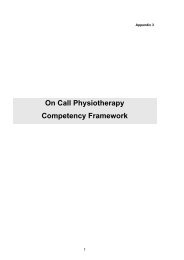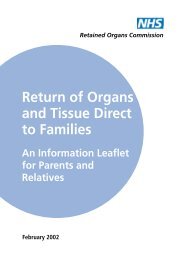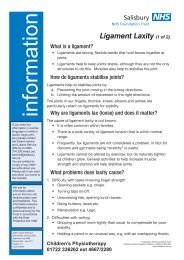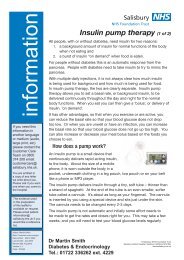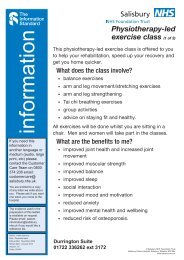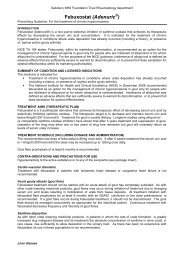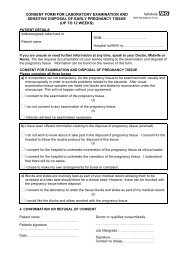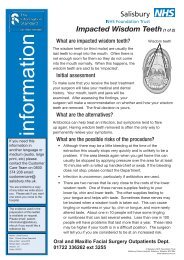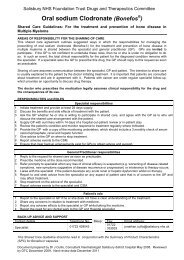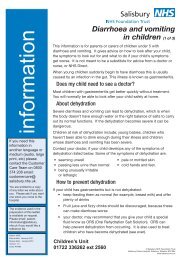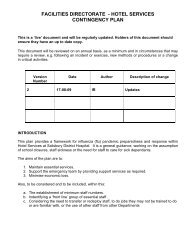Dynamic Hip Screw Operation - ICID - Salisbury NHS Foundation Trust
Dynamic Hip Screw Operation - ICID - Salisbury NHS Foundation Trust
Dynamic Hip Screw Operation - ICID - Salisbury NHS Foundation Trust
Create successful ePaper yourself
Turn your PDF publications into a flip-book with our unique Google optimized e-Paper software.
information<br />
Fractured Neck of Femur <strong>Dynamic</strong> <strong>Hip</strong> <strong>Screw</strong><br />
<strong>Operation</strong><br />
Information for patients undergoing surgery (1 of 6)<br />
This leaflet is intended as a<br />
guide for you and your relatives<br />
during your stay in hospital. We<br />
hope this booklet answers all<br />
your queries, but please ask<br />
a member of staff if anything<br />
concerns you or remains unclear.<br />
What is the problem?<br />
If you need this<br />
information in another<br />
language or medium<br />
(audio, large print, etc)<br />
please contact the Patient<br />
Advice and Liaison<br />
Service (PALS) on<br />
0800 374 208 email:<br />
palservice@salisbury.<br />
nhs.uk<br />
You are entitled to<br />
a copy of any letter<br />
we write about you.<br />
Please ask if you want<br />
one when you come to<br />
the hospital<br />
We ask for information<br />
about you so<br />
that you can receive<br />
proper care and treatment.<br />
This information<br />
remains confidential<br />
and is stored<br />
securely by the <strong>Trust</strong><br />
in accordance with<br />
the Data Protection<br />
Act 1998.<br />
Author: Clare Wood<br />
Date written: March 2004<br />
Approved: November 2004<br />
Review date: October 2010<br />
Version: 1.1<br />
Code: SNew215<br />
You have been admitted<br />
to hospital after breaking<br />
(fracturing), the upper part of<br />
your thighbone (femur), close<br />
to your hip joint. This is called a<br />
‘fractured<br />
neck of femur’.<br />
Contact: Chilmark Ward<br />
Tel: 01722 336262 ext. 3140/3147<br />
A metal plate and screws need to be put into the<br />
leg in order to hold the bone ends together while<br />
the fracture heals.<br />
Having this operation will also enable you to<br />
get back on your feet again 24 – 48 hours after<br />
surgery, and hopefully home within 10 days.<br />
This operation is called a ‘dynamic hip screw’ or<br />
‘DHS’.<br />
Do I need an operation?<br />
Your bone may heal if you remain in bed for up to<br />
12 weeks after breaking your hip. However there is a high risk that serious<br />
complications may develop as a result of such a long period of bed rest.<br />
This operation will enable you to be out of bed within two days and<br />
hopefully discharged from hospital within 10 days after surgery.<br />
This will depend on your previous level of health and independence and<br />
your home situation.<br />
The story so far……<br />
You may have broken your hip after a fall.<br />
The bones can become weaker and more fragile with age and if you<br />
© <strong>Salisbury</strong> <strong>NHS</strong> <strong>Foundation</strong> <strong>Trust</strong><br />
<strong>Salisbury</strong> District Hospital, <strong>Salisbury</strong>, Wiltshire SP2 8BJ<br />
www.salisbury.nhs.uk
Fractured Neck of Femur <strong>Dynamic</strong> <strong>Hip</strong> <strong>Screw</strong> <strong>Operation</strong><br />
Information for patients undergoing surgery (2 of 6)<br />
have underlying conditions such as osteoporosis.<br />
In the emergency department, you will have had an examination and x-rays confirming the<br />
break.<br />
You will also have had pain relief offered – usually in the form of an injection.<br />
You may have also been advised not to eat and drink (nil by mouth), as you may be going<br />
for an operation within a few hours.<br />
What happens next?<br />
You will be admitted to the ward where you will be welcomed by a nurse and settled onto a<br />
bed.<br />
Your pain will be assessed and you will be offered further pain relief if necessary.<br />
The nurse will then complete some basic tests, such as pulse, blood pressure, temperature<br />
and a sample of your urine will be taken.<br />
The nurse will also need to take some details from you relating to your general health, level<br />
of fitness and home situation.<br />
This is so that planning for your discharge can be started immediately.<br />
Please tell the nursing staff if you have any allergies, and if possible inform them of any<br />
medication you take at home.<br />
If you are taking medication at home, it will be useful if there is someone that can bring your<br />
tablets in to hospital as soon as possible.<br />
Who else will I meet before my operation?<br />
You will be seen by a junior doctor who may order more x-rays and blood tests.<br />
He / she will be responsible for explaining the operation to you in detail before asking you to<br />
sign a consent form. If you have any questions at this stage, it is important that you ask the<br />
doctors or nurses.<br />
An arrow will be drawn on the leg that requires the operation.<br />
You will meet an anaesthetist, who will explain your anaesthetic and pain control to you.<br />
The anaesthetist will examine you. He or she may also ask you about other anaesthetics<br />
you may have had, as well as any chest problems, and your dental history.<br />
Before the operation<br />
The operation treated as a relative emergency and we will perform your operation on the<br />
next available emergency-operating list. If there is to be a delay in your surgery, for any<br />
reason, the doctor or nurse will explain the reasons why to you.<br />
If you wish your family will also be informed of any delays.<br />
Contact: Chilmark Ward<br />
Tel: 01722 336262 ext. 3140/3147<br />
© <strong>Salisbury</strong> <strong>NHS</strong> <strong>Foundation</strong> <strong>Trust</strong><br />
<strong>Salisbury</strong> District Hospital, <strong>Salisbury</strong>, Wiltshire SP2 8BJ<br />
www.salisbury.nhs.uk
Pre – medication<br />
Fractured Neck of Femur <strong>Dynamic</strong> <strong>Hip</strong> <strong>Screw</strong> <strong>Operation</strong><br />
Information for patients undergoing surgery (3 of 6)<br />
You may be prescribed drugs to take before your surgery to help you relax. If the doctors<br />
prescribe these for you, the nurse will given them to you and will advise you that you may<br />
feel sleepy.<br />
The nurse will ensure you take them and will advise you remain in bed until your operation.<br />
Pre – Operative Care<br />
To reduce the risk of being sick during your anaesthetic, you will not be allowed to eat<br />
anything for 6 hours before your operation. However you will be allowed to drink clear fluids<br />
(water, squash etc.) up to 2 hours beforehand. The nurses will let you know when you<br />
should stop eating and drinking.<br />
We will provide you with a loose fitting cotton theatre gown to wear to theatre. Cotton briefs<br />
may be worn if you wish.<br />
You will also be measured and fitted with an elastic ‘compression’ stocking to wear on your<br />
‘good’ leg. These reduce the risk of developing a blood clot in your legs following surgery.<br />
The nurses will give you an information sheet to explain the importance of this.<br />
The nurse will ask you to remove all jewellery, (except wedding rings, which we cover with<br />
tape).<br />
We strongly suggest your valuables be sent home with your family for safekeeping. If<br />
this is not possible, we will offer to put your valuables in the ward safe, and you will be<br />
given a receipt. If you do not wish to part with your valuables, you will be asked to sign an<br />
indemnity form.<br />
You will also be asked to remove any make up, contact lenses and false teeth.<br />
Transfer to theatre<br />
A porter will arrive to take you to theatre on your bed. A theatre nurse will welcome you<br />
there and check your details again.<br />
You will then be taken through to the anaesthetic room, where a small needle will be placed<br />
in the back of your hand and you will be given drugs to send you off to sleep.<br />
The operation<br />
The operation involves making a cut over your hip joint of about 8 - 12 inches in length.<br />
The surgeon will insert a long screw into the ball at the top of the hip joint and secure it<br />
with a stabilising plate and screws, which is attached to the thighbone.<br />
Your wound will have stitches or metal clips to keep the edges while it heals. A nurse will<br />
remove these 12 – 14 days following your operation.<br />
You may have a small drainage tube in your leg to reduce the amount of bruising. This will<br />
be removed on the ward 24 hours after surgery.<br />
Contact: Chilmark Ward<br />
Tel: 01722 336262 ext. 3140/3147<br />
© <strong>Salisbury</strong> <strong>NHS</strong> <strong>Foundation</strong> <strong>Trust</strong><br />
<strong>Salisbury</strong> District Hospital, <strong>Salisbury</strong>, Wiltshire SP2 8BJ<br />
www.salisbury.nhs.uk
Fractured Neck of Femur <strong>Dynamic</strong> <strong>Hip</strong> <strong>Screw</strong> <strong>Operation</strong><br />
Information for patients undergoing surgery (4 of 6)<br />
You will have a tube (drip), into your hand or arm replacing any lost fluid with a blood<br />
transfusion or salt solution.<br />
If you have any concerns about blood transfusions, please discuss them with the doctor or<br />
nurse.<br />
It may be necessary for you to have an oxygen mask on for some time after your operation<br />
to help you come round from the anaesthetic.<br />
While you were asleep a catheter tube may have been put into your bladder to drain urine.<br />
This is often left in place until you are back on your feet and able to use a commode or<br />
toilet.<br />
Your pain will be assessed regularly and drugs given to keep you comfortable. Please let us<br />
know if you are in pain or discomfort.<br />
What happens next?<br />
After a short time in the recovery room, a nurse from your ward will come to collect you and<br />
take you back to the ward.<br />
You will continue to have your pain, blood pressure, pulse, breathing and temperature<br />
monitored at regular intervals for some hours after the operation.<br />
You will be prescribed a small daily injection of a drug called ‘Deltaparin’. This thins your<br />
blood slightly and further reduces the risk of blood clots, (thrombosis) in the legs and chest.<br />
You may have some water soon after returning to the ward.<br />
Tea and a light diet will be offered once you are a little less sleepy and any nausea, (sick<br />
feeling), has subsided.<br />
If you do not have a catheter tube, you will be asked to pass urine in a bottle or on a<br />
bedpan within 6 – 12 hours of returning to the ward. If you are unable to pass urine after this<br />
time a catheter may have to be inserted into your bladder to assist you.<br />
It may take a day or two before your bowels open. This is not unusual. The nurses will offer<br />
mild apperients, (laxatives), to assist your bowel actions after this period.<br />
The day after surgery<br />
You should be able to eat and drink as usual. If you are drinking plenty of water, your ‘drip’<br />
will be removed.<br />
A phlebotomist (a person who takes blood samples), will visit you and take some blood<br />
from your arm. This is to ensure that you are not suffering from anaemia as a result of blood<br />
loss during the operation.<br />
It is not always necessary to give patients a blood transfusion; you may be able to have iron<br />
tablets instead.<br />
You will also have the drainage tube removed from your leg and the nurse will redress the<br />
wound.<br />
Contact: Chilmark Ward<br />
Tel: 01722 336262 ext. 3140/3147<br />
© <strong>Salisbury</strong> <strong>NHS</strong> <strong>Foundation</strong> <strong>Trust</strong><br />
<strong>Salisbury</strong> District Hospital, <strong>Salisbury</strong>, Wiltshire SP2 8BJ<br />
www.salisbury.nhs.uk
Fractured Neck of Femur <strong>Dynamic</strong> <strong>Hip</strong> <strong>Screw</strong> <strong>Operation</strong><br />
Information for patients undergoing surgery (5 of 6)<br />
You may have an x-ray taken at this stage to ensure the position of the plate and screws<br />
is satisfactory. If the x-ray is delayed over the weekend, this should not affect your<br />
rehabilitation and may be done at a later date.<br />
Physiotherapists (‘Physio’)<br />
If you are recovering well the ward physiotherapist will assist you to get out of bed for the<br />
first time 24 hours after your operation.<br />
Until the bones become stronger and begin to heal, you may be required to put a little<br />
less weight through the leg that has been operated on. You will be given a walking frame,<br />
(‘Zimmer’), to assist you with walking for the first few days.<br />
After the first visit, the physiotherapist will see you regularly to monitor your progress and<br />
teach you the best way to manoeuvre on and off the bed and to walk safely.<br />
The physiotherapist may not see you at the weekend, but you will be expected to practice<br />
walking and exercise at this time.<br />
After a few days, depending on your progress, the physiotherapist will exchange your frame<br />
for crutches and encourage you to take longer walks.<br />
If necessary, nearer your discharge day, he/she will also teach you how to manage to walk<br />
up and down stairs.<br />
Occupational Therapists (‘OT’)<br />
The OT will visit you around the second or third day after your operation.<br />
They are responsible for enabling your safe transition between hospital and home, and will<br />
ask you or your family for details about your house and who helps you at home.<br />
For example the OT may need to know whether you have steps or stairs, how high your<br />
chairs or toilets are or whether you have anyone to help you with household chores or<br />
shopping.<br />
Depending on your needs, they will be able to give advice and practical help, such as<br />
providing bed and chair raises, high toilet seats, or installing handrails for you at home.<br />
If it is felt that you need extra help at home this will be discussed with you permission<br />
obtained to refer you to a social worker or the Hospital Alternative Team, (HAT) so that<br />
someone can assist you with personal care, shopping or meals.<br />
Your permission, or that of your nominated next of kin, is required before a referral to social<br />
services takes place.<br />
General recovery<br />
This surgery is major, and some patients are unable to go home within the expected 7 – 10<br />
days.<br />
If you are required to remain on hospital for a little extra rehabilitation you may be referred<br />
to an elderly care doctor and my be transferred to another ward in the hospital, or to a<br />
Contact: Chilmark Ward<br />
Tel: 01722 336262 ext. 3140/3147<br />
© <strong>Salisbury</strong> <strong>NHS</strong> <strong>Foundation</strong> <strong>Trust</strong><br />
<strong>Salisbury</strong> District Hospital, <strong>Salisbury</strong>, Wiltshire SP2 8BJ<br />
www.salisbury.nhs.uk
Fractured Neck of Femur <strong>Dynamic</strong> <strong>Hip</strong> <strong>Screw</strong> <strong>Operation</strong><br />
Information for patients undergoing surgery (6 of 6)<br />
hospital nearer to your home under the care of your GP.<br />
It is hoped that with this extra physiotherapy and rehabilitation, you will make a full<br />
recovery.<br />
Please ask the ward sister or nursing staff if you require any further information.<br />
Some useful telephone numbers<br />
Main Hospital Number (01722) 336262 followed by:<br />
Chilmark Ward Ext 2640 or 2641 Fracture Clinic Ext 4176<br />
Physiotherapist Ext 2377 Occupational Therapist Ext 2377<br />
Social Worker Ext 2404 Pharmacy Help Line Ext 4270<br />
PALS office (Patient Advocacy Liaison Service) Ext 2960 Or freephone 0800 374 208<br />
The space below may be handy for any notes or questions you might have!<br />
Notes:<br />
Contact: Chilmark Ward<br />
Tel: 01722 336262 ext. 3140/3147<br />
© <strong>Salisbury</strong> <strong>NHS</strong> <strong>Foundation</strong> <strong>Trust</strong><br />
<strong>Salisbury</strong> District Hospital, <strong>Salisbury</strong>, Wiltshire SP2 8BJ<br />
www.salisbury.nhs.uk


